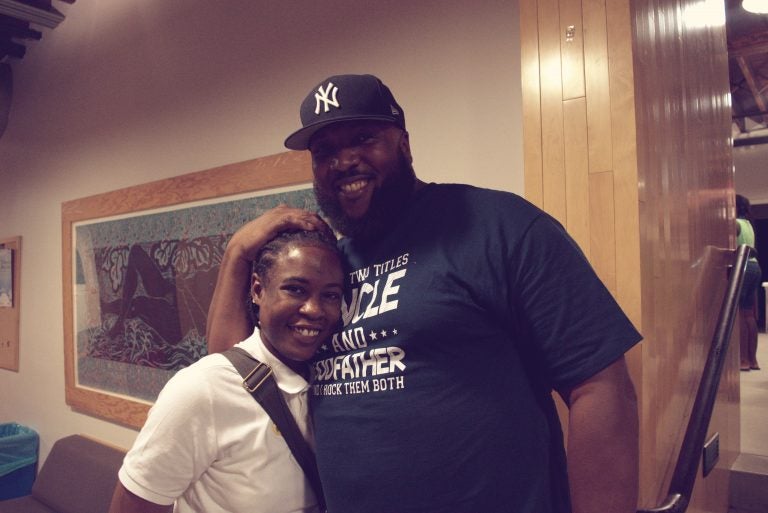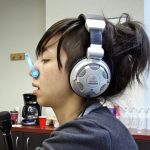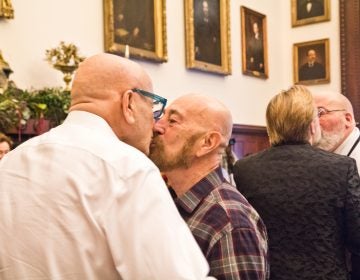With voices of experience, Philadelphia calling out for LGBTQ foster parents
In March, the city's Department of Human Services launched a citywide recruitment drive, in hopes of attracting 300 new foster families.

Toney Morse with one of his grown foster children, LaTonya Myers. (Liz Tung/WHYY)
On a steamy Thursday evening at the Penn LGBT Center, the standing-room-only crowd listened raptly as a buff, middle-aged guy with tattoos up his arms described his first awkward encounters with fatherhood.
“I’m like, ‘Oh my God — we’re two guys, we have three girls,’ ” he recalled. “I gotta bathe them! What am I … How do we …
“Those are the weird questions that kind of come up.”
He paused, before adding, “And yes, I’ve also learned how to do girls’ hair.”
Stories like his were par for the course at the recruitment session aimed at potential LGBTQ foster parents.
While city officials fielded questions about the application process, a panel of veteran LGBTQ foster parents dig into a few of the messier questions.
Among them is Toney Morse, who said he currently fosters 12 boys.
“I love talking about my babies,” he said. “And I love taking some of the fear and doubt that novices, I guess you would call it, would have in thinking about moving towards being a foster parent. I love if I can lift some of that worry off of them.”
And there’s plenty to worry about. In addition to the baseline challenges of fostering — from the complicated system, to navigating children’s past traumas — Morse said LGBTQ foster parents deal with a whole other layer of difficulty.
“The biggest thing really is the stigma,” Morse said. “And, can you do it? Do you have the same parenting gene?”
Philadelphia’s Department for Human Services, together with the Mayor’s Office of LGBT Affairs and a nonprofit called Philadelphia Family Pride, launched these targeted information sessions last year. Department of Human Services spokeswoman Heather Keafer said the initiative was created as part of an effort to offer greater support to LGBTQ youth. But the events also serve another purpose.
“We still get questions about who can be a foster parent,” Keafer said. “And so we really just want to expand the notion and idea of who can be a foster parent and help more people be able to consider that maybe that could be them.”
In March, the Department of Human Services launched a citywide recruitment drive, in hopes of attracting 300 new foster families.
Legal challenge continues
But the campaign was quickly overshadowed by revelations that two of the agencies that the city contracts to place children in foster homes were turning down LGBTQ applicants. The Department of Human Services responded by halting the two groups — Bethany Christian Services and Catholic Social Services — from making any new placements. While Bethany eventually agreed to accept LGBTQ applicants, Catholic Social Services struck back, suing the city of Philadelphia with claims that the city violated its religious and free speech rights.
In July, a federal court ruled that the city was within its rights to suspend its contract with the group for violating Philadelphia’s nondiscrimination policies. Catholic Social Services quickly filed an appeal, and it has since asked the U.S. Supreme Court to intervene in the case.
Mary Catherine Roper, deputy legal director at the ACLU of Pennsylvania, is among the attorneys fighting the appeal.
“When we pass nondiscrimination laws, we expect everybody to follow them,” Roper said. “And what CSS [Catholic Social Services] is claiming is that because their objections to same-sex couples are religious, that they not only are exempted from nondiscrimination laws, but can use taxpayer dollars to discriminate against Philadelphia residents who don’t meet the religious tests that CSS wants to put on them.”
The outcome of this case could potentially have major significance in Philadelphia, and beyond, she said, adding that it’s difficult to predict when that endpoint will come.
Meanwhile, Keafter said the city plans to continue its drive to recruit LGBTQ foster parents.
“Whether you’re single, married, gay, straight partnered — whatever your situation, think about if you have the resources and time and attention to give a young person in need,” she said.
WHYY is your source for fact-based, in-depth journalism and information. As a nonprofit organization, we rely on financial support from readers like you. Please give today.




